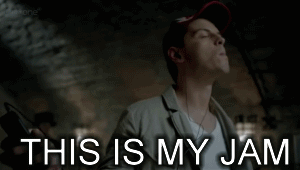I hadn't heard of Emily St. John Mandel's Station Eleven until Kayleigh/Nylon Admiral's review, where she called it "a mix of dystopia and Shakespeare with just a smidge of Star Trek" and yes, she nails it with that description.
The story opens during a production of King Lear where Lear (the esteemed actor and tabloid regular Arthur Leander) suffers a fatal heart attack during the show. A former paparazzo/current EMT does his best to revive the actor but it's too late and the man sneaks off into the night to avoid the chaos that is about to come down. But he doesn't get very far before chaos comes at him from a different direction. A doctor friend of his tells him there's some sort of virus, far more deadly than what they'd encountered before, that seems to be hitting Toronto. Toronto isn't the only victim and within a very short span of time, something like 90% of the world's population has been wiped out.
The story jumps back and forth between the current day, and a traveling symphony that roams the new land performing shows (mostly Shakespeare!) for the various towns and settlements that are left, and flashbacks to the life of Arthur Leander. I t seems like a weird point to jump back to but between our main characters, Arthur seems to be a unifying force, even if they don't realize it.
The focus of the story isn't on survival. There's a lot about the place for art in this new world. There's much about the relationships between people and how those relationships change us.
There is a plot that sounds like it would be the main driver, but really feels secondary, about a Prophet that is wandering the same roads and visiting the same towns the Symphony has, but something is a bit culty about this guy and his followers. I was surprised there wasn't more to this storyline (I felt it was sort of rushed) but really, the rest is so so good, it feels like nitpicking at this point.
The writing is wonderful and I found myself highlighting a number of lines, so why don't I share some of those with you?
I've been taking art history classes on and off for years, and between projects. And of course art history is always pressed up close against non-art history, you see catastrophe after catastrophe, terrible things, all these moments when everyone must have thought the world was ending, but all those moments, they were all temporary. It always passes.
Jeevan's understanding of disaster preparedness was based entirely on action movies, but on the other hand, he'd seen a lot of action movies.
These are not her people. She is marooned on a strange planet. The best she can do is pretend to be unflappable when she isn't.Gif rating:
Title quote page 58, location 885
St. John Mandel, Emily. Station Eleven. Vintage, 2014. Kindle























